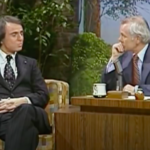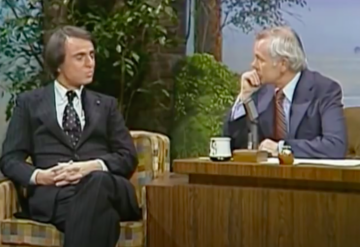Carl Sagan Tells Johnny Carson What’s Wrong with Star Wars: “They’re All White” & There’s a “Large Amount of Human Chauvinism in It” (1978)


Is Star Wars science fiction or fantasy? Different fans make different arguments, some even opting for a third way, claiming that the ever-multiplying stories of its ever-expanding fictional universe belong to neither genre. Back in 1978, the year after the release of the original Star Wars film (which no one then called “A New Hope,” let alone “Episode Four”), the question was approached by no less a popular scientific personality than Carl Sagan. It happened on national television, as the astronomer, cosmologist, writer, and television host in his own right sat opposite Johnny Carson. “The eleven-year-old in me loved them,” Sagan says in the clip above of Star Wars, Close Encounters of the Third Kind, and other then-recent space-themed blockbusters. “But they could’ve made a better effort to do things right.”
Everyone remembers how Star Wars sets its stage: “A long time ago in a galaxy far, far away.” But right there, Sagan has a problem. Despite its remoteness from us, this galaxy happens also to be populated by human beings, “the result of a unique evolutionary sequence, based upon so many individually unlikely, random events on the Earth.”
So Homo sapiens couldn’t have evolved on any other planet, Carson asks, let alone one in another galaxy? “It’s extremely unlikely that there would be creatures as similar to us as the dominant ones in Star Wars.” He goes on to make a more specific critique, one publicized again in recent years as ahead of its time: “They’re all white.” That is, in the skins of most of the movie’s characters, “not even the other colors represented on the Earth are present, much less greens and blues and purples and oranges.”
Carson responds, as anyone would, by bringing up Star Wars‘ cantina scene, with its rogue’s gallery of variously non-humanoid habitués. “But none of them seemed to be in charge of the galaxy,” Sagan points out. “Everybody in charge of the galaxy seemed to look like us. I thought there was a large amount of human chauvinism in it.” That no medal is bestowed upon Chewbacca, despite his heroics, Sagan declares an example of “anti-Wookiee discrimination” — with tongue in cheek, granted, but pointing up how much more interesting science fiction could be if it relied a little less on human conventions and drew a little more from scientific discoveries. Not that Star Wars is necessarily science fiction. “It was a shootout, wasn’t it?” Carson asks. “A Western in outer space.” Johnny never did hesitate to call ’em as he saw ’em.
Related Content:
Fans Reconstruct Authentic Version of Star Wars, As It Was Shown in Theaters in 1977
Carl Sagan on the Importance of Choosing Wisely What You Read (Even If You Read a Book a Week)
Blade Runner: The Pillar of Sci-Fi Cinema that Siskel, Ebert, and Studio Execs Originally Hated
Based in Seoul, Colin Marshall writes and broadcasts on cities, language, and culture. His projects include the Substack newsletter Books on Cities, the book The Stateless City: a Walk through 21st-Century Los Angeles and the video series The City in Cinema. Follow him on Twitter at @colinmarshall or on Facebook.
Carl Sagan Tells Johnny Carson What’s Wrong with Star Wars: “They’re All White” & There’s a “Large Amount of Human Chauvinism in It” (1978) is a post from: Open Culture. Follow us on Facebook and Twitter, or get our Daily Email. And don't miss our big collections of Free Online Courses, Free Online Movies, Free eBooks, Free Audio Books, Free Foreign Language Lessons, and MOOCs.
from Open Culture https://ift.tt/3ibNj38
via Ilumina

Comments
Post a Comment